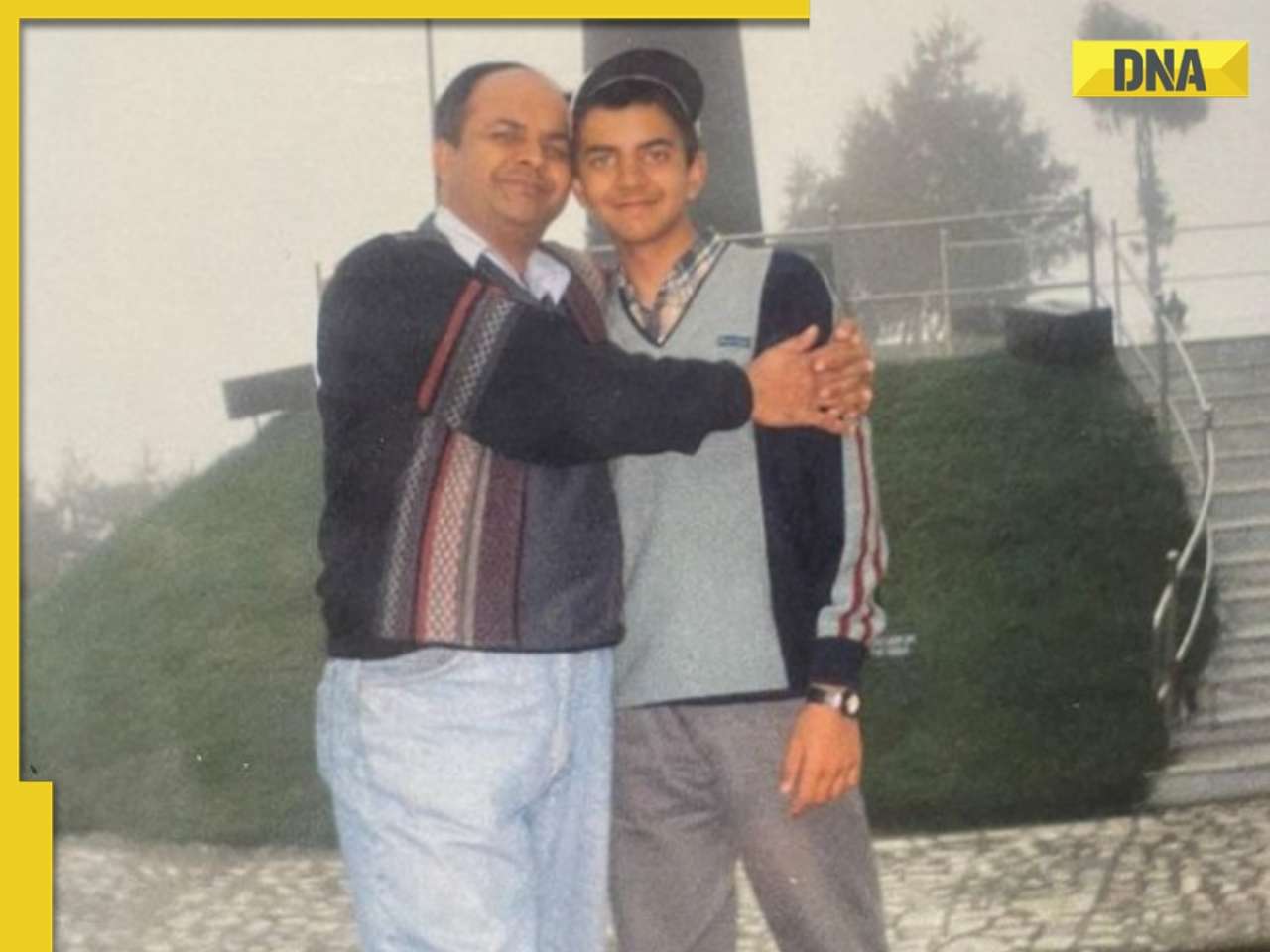The stereotypical notion of a moral policeman is that of an illiterate thug who goes about vandalising art shows. But when you look for the human being behind the cliched image, what emerges is a more complex persona. Here we meet two moral cops, from different generations, and different cities, who allow us a glimpse into their lives and obsessions
Shivaji Vatkar bears no resemblance to a policeman of any kind, moral, immoral or amoral. The 63-year-old activist of the Hindu Janajagruti Samiti (HJS) looks too frail to be an enforcer. Yet his track record as a moral cop out on a mission to save ‘Hindu culture’ is forbiddingly impressive. In all probability, it was his ‘moral criticism’ that inspired an Indian painter called MF Husain to flee his homeland and seek cultural nourishment in Dubai. For Vatkar had launched a relentless drive against Husain and his ‘anti-Hindu’, works. He scuttled the auction of a Husain painting because it depicted Parvati in a “compromising position” with Nandi. He bullied the mighty ABN-AMRO Bank into scrapping an entire range of credit cards that happened to feature Husain’s works. And more recently, in January this year, he forced artist Nadita Das to remove her paintings from Jehangir Art Gallery because they showed Hindu deities without any clothes on.
Cut to Bangalore. Vasantkumar Bhavani is the head of the Bangalore unit of the Sri Ram Sene, the Hindu activist group that has been in the news for seeking to rescue ‘Indian culture’ from the dirty habit of visiting pubs. At 32, Bhavani represents GenNext of the moral policing brigade. A commerce graduate, he wanted to become an air force pilot. But today, he is flying high in Hindutva politics and culture policing. Bhavani’s grandfather, TM Munusomaya, was a freedom fighter and a Gandhian. One wonders what the Gandhian might have had to say about a grandson who adopts distinctly anti-Gandhian means to protect his country’s ‘Hindu culture’.
Vatkar and Bhavani belong to two different generations of moral police. They do not fit into the media stereotype of moral policemen as goons who indulge in mindless vandalism. Both are well-educated. Vatkar is a mechanical engineer from Pune’s College of Engineering, while Bhavani is a commerce graduate. But does education have anything at all to do with it? “I don’t believe education can guarantee absence of fundamentalism. No matter how highly educated one may be, if your social conditioning — in your family, peers or in political circles — encourages you to turn violent, education is hardly a respite,” says Nandini Sardesai, sociologist and member of the Censor Board.
In the case of Vatkar, he was born into a farmer’s family in a small hamlet called Upale in the Osmanabad district of Maharashtra. “I was brought up in a middle class family where religion was restricted to puja and arati only,” he says. There was nothing in his upbringing to indicate that one day he will turn into a violent agitator striving to uphold the ‘Hindu’ faith. After college, he settled into a nice career. He worked with Talco Industries, and later with Mazgaon Docks. He retired as deputy general manager from the Shipping Corporation of India three years ago.
For much of his youth and adult life, Vatkar wasn’t unduly anxious about leading a suitably ‘Hindu’ life. “The change happened when I met Sanatan Sanstha’s Jayant Athavale in 1989. He convinced me to pray for a few minutes every morning,” he recalls. Even at this stage, Vatkar’s devotion to the Hindu faith remained distinctly spiritual for many years. Then, in 2002, Vatkar came into contact with the HJS. With retirement on the horizon, the vacuum created by the absence of a full-time job could not be filled by gentle Hindu spirituality alone. He needed something more substantive to find an outlet for his energies, to lend a purpose to his daily life. He found such an outlet and a purpose as a HJS member. The same year that he retired, he launched his agitation targeting Hussain.
Today, Vatkar conducts camps where he explains to youngsters, most of whom he believes are ‘misled’, how to respect ‘Hindu culture’. To Vatkar’s credit, however, his moral policing begins at home: he does not allow his 11-year-old grandson to celebrate his birthday by cutting a cake. Instead, the occasion has to be commemorated through puja and the solemn application of tilak on the kid’s forehead.
In the case of Bhavani, entry into the realm of moral policing happened through college politics. While his father was in the real estate business, he himself was an automobile spare parts dealer. During Ganesh Puja celebrations in 2007, the immersion procession being undertaken by Jai Bhavanio Sanga, an organisation of which Bhavani had been a member in his college years, was disrupted by some miscreants from another community. As tension mounted, Sri Ram Sene’s Pramod Muthalik jumped into the fray, raising the temperature higher. In the course of defusing the crisis, Bhavani met Muthalik, and eventually ended up as his main man in Bangalore. Today, Bhavani has handed over his business to a friend, and is a full-time political activist and moral cop. “My role models are Bhagat Singh, Subash Chandra Bose and Chandra Shekar Azad,” he says.
As for Vatkar, he insists that he does not believe in vandalism. “But if people don’t listen to us, then we have to act.”
(With inputs from Kiran Tare and Kareena Gianani in Mumbai and Vasu Devan in Bangalore)
![submenu-img]() Anant Raj Ventures into tier 2 and tier 3 cities, pioneering growth in India’s real estate sector
Anant Raj Ventures into tier 2 and tier 3 cities, pioneering growth in India’s real estate sector![submenu-img]() Sophie Turner reveals she wanted to terminate her first pregnancy with Joe Jonas: 'Didn't know if I wanted...'
Sophie Turner reveals she wanted to terminate her first pregnancy with Joe Jonas: 'Didn't know if I wanted...'![submenu-img]() Meet outsider who was given no money for first film, battled depression, now charges Rs 20 crore per film
Meet outsider who was given no money for first film, battled depression, now charges Rs 20 crore per film![submenu-img]() This is owner of most land in India, owns land in every state, total value is Rs...
This is owner of most land in India, owns land in every state, total value is Rs...![submenu-img]() Meet man who built Rs 39832 crore company after quitting high-paying job, his net worth is..
Meet man who built Rs 39832 crore company after quitting high-paying job, his net worth is..![submenu-img]() Meet woman who first worked at TCS, then left SBI job, cracked UPSC exam with AIR...
Meet woman who first worked at TCS, then left SBI job, cracked UPSC exam with AIR...![submenu-img]() Meet engineer, IIT grad who left lucrative job to crack UPSC in 1st attempt, became IAS, married to an IAS, got AIR...
Meet engineer, IIT grad who left lucrative job to crack UPSC in 1st attempt, became IAS, married to an IAS, got AIR...![submenu-img]() Meet Indian woman who after completing engineering directly got job at Amazon, then Google, Microsoft by using just...
Meet Indian woman who after completing engineering directly got job at Amazon, then Google, Microsoft by using just...![submenu-img]() Meet man who is 47, aspires to crack UPSC, has taken 73 Prelims, 43 Mains, Vikas Divyakirti is his...
Meet man who is 47, aspires to crack UPSC, has taken 73 Prelims, 43 Mains, Vikas Divyakirti is his...![submenu-img]() IIT graduate gets job with Rs 100 crore salary package, fired within a year, he is now working as…
IIT graduate gets job with Rs 100 crore salary package, fired within a year, he is now working as…![submenu-img]() DNA Verified: Is CAA an anti-Muslim law? Centre terms news report as 'misleading'
DNA Verified: Is CAA an anti-Muslim law? Centre terms news report as 'misleading'![submenu-img]() DNA Verified: Lok Sabha Elections 2024 to be held on April 19? Know truth behind viral message
DNA Verified: Lok Sabha Elections 2024 to be held on April 19? Know truth behind viral message![submenu-img]() DNA Verified: Modi govt giving students free laptops under 'One Student One Laptop' scheme? Know truth here
DNA Verified: Modi govt giving students free laptops under 'One Student One Laptop' scheme? Know truth here![submenu-img]() DNA Verified: Shah Rukh Khan denies reports of his role in release of India's naval officers from Qatar
DNA Verified: Shah Rukh Khan denies reports of his role in release of India's naval officers from Qatar![submenu-img]() DNA Verified: Is govt providing Rs 1.6 lakh benefit to girls under PM Ladli Laxmi Yojana? Know truth
DNA Verified: Is govt providing Rs 1.6 lakh benefit to girls under PM Ladli Laxmi Yojana? Know truth![submenu-img]() In pics: Taarak Mehta Ka Ooltah Chashmah actress Deepti Sadhwani dazzles in orange at Cannes debut, sets new record
In pics: Taarak Mehta Ka Ooltah Chashmah actress Deepti Sadhwani dazzles in orange at Cannes debut, sets new record![submenu-img]() Ananya Panday stuns in unseen bikini pictures in first post amid breakup reports, fans call it 'Aditya Roy Kapur's loss'
Ananya Panday stuns in unseen bikini pictures in first post amid breakup reports, fans call it 'Aditya Roy Kapur's loss'![submenu-img]() Remember Harsh Lunia? Just Mohabbat child star, here's how former actor looks now, his wife is Bollywood's popular...
Remember Harsh Lunia? Just Mohabbat child star, here's how former actor looks now, his wife is Bollywood's popular...![submenu-img]() Mother's Day 2024: Bollywood supermoms who balance motherhood, acting, and run multi-crore businesses
Mother's Day 2024: Bollywood supermoms who balance motherhood, acting, and run multi-crore businesses![submenu-img]() Rocky Aur Rani's Golu aka Anjali Anand shocks fans with drastic weight loss without gym, says fitness secret is...
Rocky Aur Rani's Golu aka Anjali Anand shocks fans with drastic weight loss without gym, says fitness secret is...![submenu-img]() Haryana Political Crisis: Will 3 independent MLAs support withdrawal impact the present Nayab Saini led-BJP government?
Haryana Political Crisis: Will 3 independent MLAs support withdrawal impact the present Nayab Saini led-BJP government?![submenu-img]() DNA Explainer: Why Harvey Weinstein's rape conviction was overturned, will beleaguered Hollywood mogul get out of jail?
DNA Explainer: Why Harvey Weinstein's rape conviction was overturned, will beleaguered Hollywood mogul get out of jail?![submenu-img]() What is inheritance tax?
What is inheritance tax?![submenu-img]() DNA Explainer: What is cloud seeding which is blamed for wreaking havoc in Dubai?
DNA Explainer: What is cloud seeding which is blamed for wreaking havoc in Dubai?![submenu-img]() DNA Explainer: What is Israel's Arrow-3 defence system used to intercept Iran's missile attack?
DNA Explainer: What is Israel's Arrow-3 defence system used to intercept Iran's missile attack?![submenu-img]() Sophie Turner reveals she wanted to terminate her first pregnancy with Joe Jonas: 'Didn't know if I wanted...'
Sophie Turner reveals she wanted to terminate her first pregnancy with Joe Jonas: 'Didn't know if I wanted...'![submenu-img]() Meet outsider who was given no money for first film, battled depression, now charges Rs 20 crore per film
Meet outsider who was given no money for first film, battled depression, now charges Rs 20 crore per film![submenu-img]() Meet actress who quit high-paying job for films, director replaced her with star kid, had no money, now lives in...
Meet actress who quit high-paying job for films, director replaced her with star kid, had no money, now lives in...![submenu-img]() This star kid's last 3 films lost Rs 5000000000 at box office, has no solo hit in 5 years, now has lost four films to...
This star kid's last 3 films lost Rs 5000000000 at box office, has no solo hit in 5 years, now has lost four films to...![submenu-img]() Meet actress viral for just walking on screen, belongs to royal family, has no solo hit in 15 years, but still is…
Meet actress viral for just walking on screen, belongs to royal family, has no solo hit in 15 years, but still is…![submenu-img]() This is owner of most land in India, owns land in every state, total value is Rs...
This is owner of most land in India, owns land in every state, total value is Rs...![submenu-img]() Blinkit now gives free dhaniya with veggie orders, thanks to Mumbai mom
Blinkit now gives free dhaniya with veggie orders, thanks to Mumbai mom![submenu-img]() Meet man, an Indian who entered NASA's Hall of Fame by hacking, earlier worked on Apple's...
Meet man, an Indian who entered NASA's Hall of Fame by hacking, earlier worked on Apple's...![submenu-img]() 14 majestic lions cross highway in Gujarat's Amreli, video goes viral
14 majestic lions cross highway in Gujarat's Amreli, video goes viral![submenu-img]() Here's why Isha Ambani was not present during Met Gala 2024 red carpet
Here's why Isha Ambani was not present during Met Gala 2024 red carpet






















































)
)
)
)
)
)